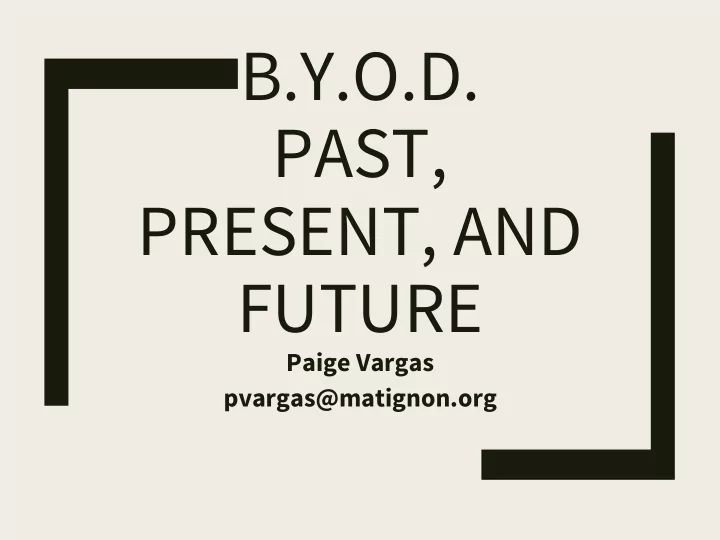

B.Y.O.D. PAST, PRESENT, AND FUTURE Paige Vargas pvargas@matignon.org
How did this year go? ■ Better than predicted ■ Hit bumps ■ Google Platform – unifying school ■ AUP ■ Firewall
What did we learn? ■ WIRELESS! ■ Devices for Educational Purposes ■ Technology is a resource – END ALL, BE ALL? ■ IT issues (hardware) ■ e-books ■ Loaner Devices ■ VPNs (Virtual Private Network) ■ iPads – ex: Google Docs Add-ons
Next Year’s Plans ■ Parent Resources ■ Communication w/ parents toward policies – Google Passwords ■ More PD for teachers ■ Digital Citizenship training ■ Google Apps ■ Email culture
Your Thoughts? ■ Strengths ■ Weaknesses
Flipped Classrooms Kelsey Ridley Matignon Parent Group Meeting May 11, 2016
What’s the �lip?
What’s the �lip? ● Introduction → exploration → application → deep understanding ● “Traditional” classrooms: initial content delivery at school, exploration and application at home ● “Flipped” classrooms: content introduction at home, exploration and application at school
Why the �lip? ● Goal: richer use of classroom time ● Note-taking is passive ; done better at home? ○ Pause and rewatch video, spend more time on areas you don’t understand, take notes at own pace, come prepared to class with questions ● Use class time for active learning and engagement ○ Problem solving, discussion, labs, activities, etc. done in the presence of teacher and peers ○ Feedback & real-time correction
How do you �lip? ● Students at home: ○ Read text ○ Watch videos ○ Take notes ○ Brainstorm questions ● Students in the classroom: ○ Apply knowledge ○ Work alone & in groups ○ Get immediate help & feedback ○ Gain confidence & deeper understanding
Strategically-planned learning environment to enhance prior knowledge and provide an in-depth, personalized, and active learning experience.
Strengths and weaknesses ● “Real time” corrections ● Students must do work (while they still care!) at home consistently ● More one-on-one face ● Cannot ask a video or time textbook questions ● Differentiation ● Requires device and ● Increased classroom internet connection at engagement home (sometimes for ● Research shows multiple students!) ● At home, teacher cannot improved grades respond mid-lecture to student cues
Flipping Matignon Classes Theology (Mr. Keppel) AP Psychology (Ms. Burke) ● Home: short excerpts ● Home: read textbook from theology texts to and take notes ● Class: review, familiarize them with complex ideas discussion, activities, ● Class: Discussion, demonstrate concepts, highlight and try experiments, make it synthesize personal (e.g. key ideas personality tests)
Flipping Matignon Classes Geometry (Mrs. Ridley) History (Ms. Vargas) ● Home: read and take ● Home: watch videos intro vocab notes, (teacher-generated problem solving only and online), after they have done interspersed questions ● Class: hands-on so in class ● Class: solve problems, partner activity active group applying knowledge challenges, discussion
Let’s �lip everything! … or not? ● Teachers know their classrooms: students and subjects are different ● Even within the same subject and class, it can go well in one unit and not in another ● Best used in conjunction with a variety of teaching methods
Recommend
More recommend